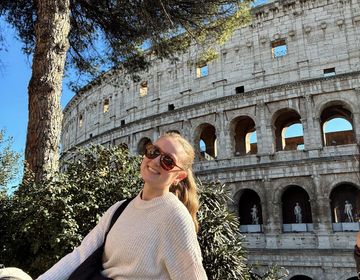What a Privilege it is to Travel
It is amazing that almost two years have flown by. I vividly remember submitting my application to CIEE and dreaming of all the different types of trips I would take, the people I would meet, and the growth I would make as a person. As my second year of teaching ends, I started to reflect on the past two years and have concluded that I am privileged. Not often is the word “privileged” associated with a millennial woman of color. But I have realized that everyone is privileged in some way. Privileged, by my own definition, is if you’ve never had to think about being burdened by something, or in general, it's never acted as a barrier. For example, while in America, I’ve always had a car that I could drive. Meanwhile, in Spain I didn’t have one, so I had to rely on public transportation. I then recognized what a privilege it was to have had a car. That said, the question remains: how is travel a form of privilege?
Passport Privilege
During my travels, I have come across a multitude of people from different parts of the world and was humbled by the fact that because of where I was born and the passport that I possess, it opens doors that many can’t have access to or the may have to pay in order to get get entry. For example, a strong or highly valued passport allows entry into many countries without a visa. Singapore, Japan, France, Germany, Italy, and Spain rank among the strongest passports; they can enter 194 countries without the need of a visa. On the other end of the spectrum, Afghanistan, Syria, and Iraq have weak passports and are only allowed entry into 28 countries.
The weaker your passport is, the harder it becomes to freely travel the world and it often means that individuals must apply for a visa of some sort and wait. Despite this, applying for a visa doesn’t necessarily equate to entry because there is always the potential for denial; This also risks the money that was spent on the application fee and the time that is spent waiting for entry is wasted. So, the next time you travel and all you do is flash your passport, recognize the weight and privilege you possess just for being born in that specific country.
Vacation Time off
A typical American’s work schedule of a 9-5 usually offers two weeks of vacation per year- something far below than what most European countries offer. Thus, when Americans do travel, often, they are forced to cram many sites into a short amount of time. So, when European onlookers wonder why Americans try to see 10 countries in five days, it’s because that's all that is allowed if they want to stay employed back home.
Finances
Travel isn’t cheap. In the past two years, I took advantage of traveling extensively throughout Europe because I was already here. Getting around Europe can be fairly inexpensive but when you have to travel from a different continent, the costs can add up quickly, lodging, travel ,excursions and more. It’s true that the cost of living in Spain is not as high compared to other European countries, but traveling to Spain for vacation can be expensive for tourists from the United States. Many Americans have other priorities and costs to attend to, so traveling isn’t always at the top of the list.
Gender Privilege
Respectfully, I can say that it isn’t often that I think of my gender as a barrier to travel. However with that being said, I did not hang out late at night, tell people that I was solo traveling, or walk back to my lodging alone late at night. To me, this was just practicing safety. But I do recognize that many men most likely do not need to exercise the same precautions for the same reasons that I did. This alone may deter some people from traveling alone or to certain countries.
Language Privilege
As a language assistant, my job was to foster conversations in English amongst my students and to cultivate a comfortable environment to practice speaking with a native. The English assistant program exists to elevate Spain's English level to the standard of other European countries. At the end of the day, if you can’t speak the native tongue where you’re traveling, there is a high chance that you will find someone that speaks English. Often, I was astonished by how easy it was to use foreign public transportation and go to different airports because the signs had dual translations, one in the native language and one in English. While I can speak both English and Spanish, if I was traveling outside of Spain and couldn’t find an English speaker, there was a high probability that I would find a Spanish speaker. That said, if you speak two or more languages, traveling will be less intimidating and more enjoyable.
Lesson Learned
These past two years, I have visited countless cities, tasted foods from different backgrounds, and have seen breathtaking views. I recognize that this is a privilege that many may not have the time or the finances to do so. However, I hope that these experiences have changed me for the better and will leave me more of the world we live in, and what a privilege it has been to see so much of it.
Related Posts

How to Plan a Weekend in Rome
After my weekend trip to Rome, I have compiled my tips for must-see sites, what to skip, where to shop, and what to eat!
Managing Mental Health While Teaching Abroad
Our expectations of Teaching Abroad can be far off from our reality, having an effect on our mental health, and that’s okay. Here are a few things I have found to be helpful in (gently) taking back control and creating a smoother transition into my new life as an English Teacher abroad in Spain.

